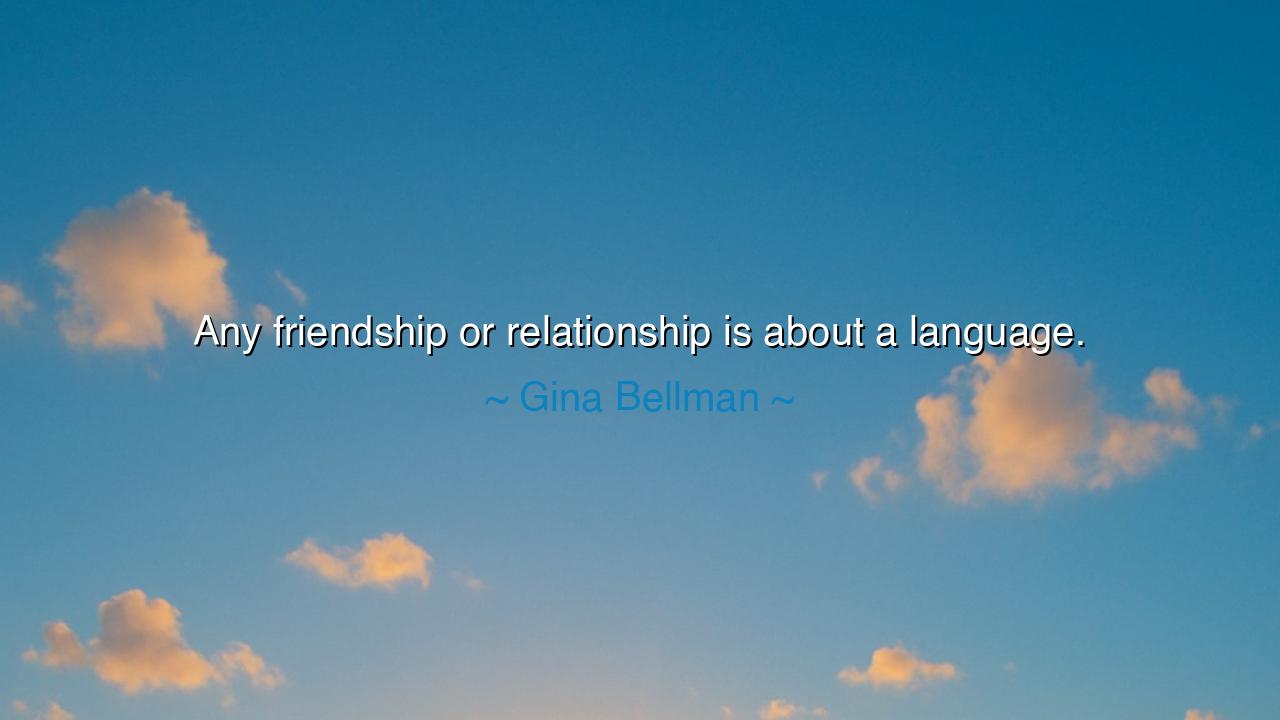
Any friendship or relationship is about a language.






"Any friendship or relationship is about a language." These words from Gina Bellman speak to the profound truth that communication lies at the heart of every meaningful connection. Language is not merely a tool for exchanging words; it is the vessel that carries our thoughts, our emotions, and our very souls. It is through language—whether spoken or unspoken—that we create, nurture, and sometimes even destroy the bonds we share with others. In friendship and relationships, the language we speak with each other becomes the bridge between our inner worlds, allowing us to connect, to understand, and to grow together.
The ancient Greeks, with their deep understanding of human nature, recognized that language was the key to all relationships. Aristotle, in his work on ethics, wrote that friendship is the foundation of a good life. But what is a friendship if not an exchange of words, gestures, and emotions? The very act of sharing ourselves through language is what creates the bond of friendship. Whether in a conversation, a shared silence, or an act of kindness, the language of friendship is not bound by words alone but by the shared understanding that flows between two souls. In this sense, language becomes the medium through which trust, affection, and loyalty are communicated.
Consider the example of Socrates and his companions. The dialogues that Socrates had with his friends, particularly Plato, were not merely intellectual exercises; they were conversations that shaped their souls. Through the language of questioning and dialogue, Socrates sought to elevate the minds of those around him, not just through the content of his teachings, but through the way he communicated. It was the language of questioning, the gentle probing of assumptions, that helped his disciples discover deeper truths about themselves and the world. In this way, their relationship was a living testament to the power of language—not just as a tool of communication, but as the very fabric of their shared journey toward wisdom.
In every meaningful friendship, there is a unique language that develops between the individuals involved. This language is more than the words we use; it is the shared gestures, the unspoken understanding, the emotional resonance that carries meaning between two people. For instance, consider the bond between David and Jonathan in the Bible. Their friendship was not one of words alone, but of a language of loyalty, trust, and mutual respect. When David faced the threats of his enemies, it was not simply the words that Jonathan spoke, but the language of actions—of standing by David even when it meant going against his own father, King Saul. Their bond was rooted in a shared understanding that transcended mere words, and it was this language of loyalty and sacrifice that defined their friendship.
In the realm of relationships, this same idea applies. Communication is the bedrock of any strong relationship, whether it be between lovers, family members, or colleagues. The language of love is not always spoken aloud. It is conveyed in the soft touch of a hand, in the look exchanged between two people who truly understand each other, in the silence shared after a difficult moment. True communication does not require constant words; it is the deep, non-verbal language of connection that often speaks the loudest. Gina Bellman’s insight reminds us that in every relationship, there is a language that goes beyond words—one that communicates affection, understanding, and care.
This lesson is clear: the language of friendship and relationship is not just in the words we speak, but in the deeper connections we form through actions, gestures, and the emotional bonds that transcend the limitations of speech. In our own relationships, we must ask ourselves: How are we speaking to those we care about? Are we truly listening, or are we only speaking words? Are we using the language of empathy, the language of patience, and the language of understanding? True communication requires not just the ability to speak, but the wisdom to listen and to respond in ways that nurture and strengthen the connection.
We must also recognize that every relationship has its own unique language, one that is forged through time, experience, and shared history. Just as Socrates and Plato created a language of intellectual inquiry, so too do we create languages with those we love, based on the rhythms of our lives together. These languages are personal, shaped by our experiences, our joys, and our struggles. To cultivate a strong relationship, we must be attuned to the subtle ways in which language evolves—whether it’s in a gesture, a look, or a moment of shared silence.
The practical lesson here is one of awareness: to cultivate strong relationships, we must master the language of connection. This means listening deeply, communicating with honesty, and being attuned to the unspoken bonds that exist between us. Let us strive to create a language of compassion, understanding, and trust with those we care about. Let us remember that the power of friendship and relationship lies not in the words alone, but in the deep, shared language that emerges when two souls meet and communicate in ways that transcend speech. And may we always seek to nurture this language, for it is the essence of all meaningful human connection.






AAdministratorAdministrator
Welcome, honored guests. Please leave a comment, we will respond soon